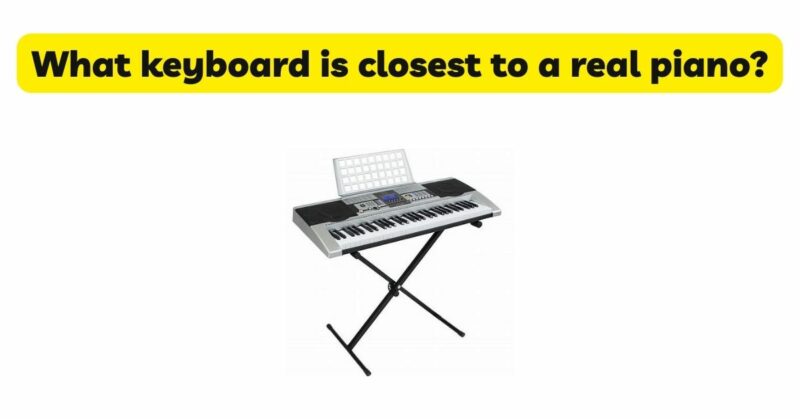For musicians seeking an instrument that comes closest to the authentic feel and sound of a real piano, the choice of a keyboard is of utmost importance. While nothing can fully replace the unique qualities of an acoustic piano, advancements in technology and engineering have allowed keyboards to emulate the touch, response, and tonal characteristics of their acoustic counterparts. In this article, we delve into the keyboards that strive to closely replicate the experience of playing a real piano, including digital pianos, hybrid pianos, and high-end stage pianos. By examining the key features, such as key action, sound quality, realism, and versatility, we aim to provide insights into the keyboards that come closest to emulating the real piano experience, helping musicians make an informed decision based on their musical preferences and needs.
- Digital Pianos: Digital pianos are designed to closely replicate the sound and feel of an acoustic piano while offering additional benefits and features. They utilize advanced sound sampling and modeling technology to capture the nuances and tonal characteristics of acoustic pianos. Digital pianos often feature weighted or graded hammer action keys, simulating the weight and response of acoustic piano keys. These keyboards strive to provide an authentic playing experience, allowing musicians to express their musicality and dynamics with precision. Some digital pianos also incorporate additional features such as multiple piano sounds, recording capabilities, and connectivity options, offering versatility and convenience without compromising the piano-like experience.
- Hybrid Pianos: Hybrid pianos offer a unique combination of acoustic and digital elements, bridging the gap between traditional pianos and digital keyboards. These instruments feature a real acoustic piano action integrated with digital sound generation and customization options. The acoustic components, including strings and hammers, provide the authentic touch and response of a real piano, ensuring a truly immersive playing experience. Hybrid pianos aim to replicate the nuances and subtleties of acoustic pianos while offering digital features such as different piano sounds, recording capabilities, and connectivity options. They provide an ideal balance for musicians who desire the traditional piano feel with the advantages of digital technology.
- High-End Stage Pianos: High-end stage pianos are specifically designed for professional musicians and performers who require the utmost realism and versatility. These keyboards employ cutting-edge technology to reproduce the sound, touch, and expressiveness of acoustic pianos. They often feature premium key actions that closely emulate the touch and response of grand pianos or high-quality upright pianos. The sound engines of these stage pianos incorporate sophisticated sound sampling and processing techniques, capturing the detailed nuances and tonal characteristics of acoustic pianos. Stage pianos provide an extensive range of piano sounds, customizable parameters, and performance features, making them an excellent choice for musicians who demand uncompromising realism and sonic versatility.
- Sound Quality and Realism: The quality and realism of the piano sound produced by a keyboard are paramount in emulating the real piano experience. Keyboards that employ high-quality sound sampling and modeling technology come closest to replicating the tonal nuances, dynamics, and resonance of an acoustic piano. The ability to reproduce the subtle variations in tone and timbre, the natural decay and sustain, and the harmonic complexity contribute to the realism of the piano sound. Additionally, keyboards that incorporate advanced sound processing algorithms and dedicated speaker systems enhance the spatial representation and clarity of the piano sound, further blurring the line between the keyboard and a real piano.
- Versatility and Additional Features: While striving to emulate the real piano experience, keyboards offer added versatility and features that enhance the overall playing experience. Some keyboards provide the option to choose from multiple piano sounds, allowing musicians to explore different tonal characteristics and styles. Additional features such as built-in effects, recording capabilities, connectivity options, and compatibility with software and apps expand the creative possibilities for musicians. These features provide musicians with the flexibility to adapt and experiment with their sound while maintaining the essence of a real piano.
Conclusion: While no keyboard can fully replicate the complexity and depth of an acoustic piano, several keyboards come remarkably close to emulating the real piano experience. Digital pianos, hybrid pianos, and high-end stage pianos excel in their ability to reproduce the touch, sound, and expressiveness of acoustic pianos. Through advancements in sound sampling, modeling technology, key action, and sound processing, these keyboards offer a compelling alternative for musicians seeking the authentic feel and sound of a real piano. The choice between a keyboard and an acoustic piano ultimately depends on individual preferences, musical requirements, and the desired balance between authenticity and versatility. By selecting a keyboard that closely emulates the real piano experience, musicians can unleash their creativity, express their musicality, and embark on a captivating musical journey.


